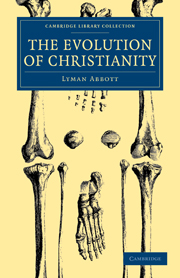Book contents
- Frontmatter
- Preface
- Contents
- CHAPTER I EVOLUTION AND RELIGION
- CHAPTER II THE EVOLUTION OF THE BIBLE
- CHAPTER III THE EVOLUTION OF THEOLOGY: THE OLD THEOLOGY
- CHAPTER IV THE EVOLUTION OF THEOLOGY: THE NEW THEOLOGY
- CHAPTER V THE EVOLUTION OF THE CHURCH
- CHAPTER VI THE EVOLUTION OF CHRISTIAN SOCIETY
- CHAPTER VII THE EVOLUTION OF THE SOUL
- CHAPTER VIII THE SECRET OF SPIRITUAL EVOLUTION
- CHAPTER IX CONCLUSION: THE CONSUMMATION OF SPIRITUAL EVOLUTION
CHAPTER III - THE EVOLUTION OF THEOLOGY: THE OLD THEOLOGY
Published online by Cambridge University Press: 29 August 2010
- Frontmatter
- Preface
- Contents
- CHAPTER I EVOLUTION AND RELIGION
- CHAPTER II THE EVOLUTION OF THE BIBLE
- CHAPTER III THE EVOLUTION OF THEOLOGY: THE OLD THEOLOGY
- CHAPTER IV THE EVOLUTION OF THEOLOGY: THE NEW THEOLOGY
- CHAPTER V THE EVOLUTION OF THE CHURCH
- CHAPTER VI THE EVOLUTION OF CHRISTIAN SOCIETY
- CHAPTER VII THE EVOLUTION OF THE SOUL
- CHAPTER VIII THE SECRET OF SPIRITUAL EVOLUTION
- CHAPTER IX CONCLUSION: THE CONSUMMATION OF SPIRITUAL EVOLUTION
Summary
The Bible is a book of religion, not a book of theology. The questions which the Hebrew mind asked were questions of religion, not of theology. Let us recur to Max Müller's definition of religion: “Religion consists in the perception of the Infinite under such manifestations as are able to influence the moral character of man.” The Hebrew prophets, then, sought for such a perception of the Infinite as would influence the moral character of those to whom they spoke. They did not ask the question, What is God? but, What is the way to Him? Nor, What is the nature of sin? but, How shall we get rid of it? Nor, What is the origin of pain? but, How shall we make a true spiritual use of it? The Bible accordingly contains few or no definitions. None of God, unless “God is love” be regarded as a definition; none of sin, unless “Sin is lawlessness” be regarded as a definition; none of faith, unless “Faith is the substance of things hoped for, the evidence of things not seen,” be regarded as a definition; and absolutely none of atonement, regeneration, the forgiveness of sin, the nature of Christ, or the divine attributes.
The book of Job, if not in authorship the oldest in the Bible, undoubtedly represents the earliest religious life. It is a picture of Hebraic thought in its beginnings.
- Type
- Chapter
- Information
- The Evolution of Christianity , pp. 68 - 95Publisher: Cambridge University PressPrint publication year: 2009First published in: 1892



